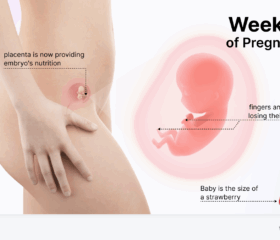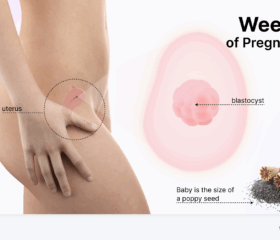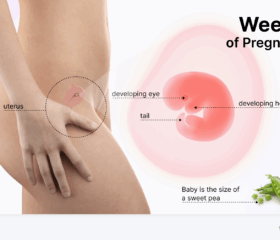Pregnancy Week by Week
13 Weeks Pregnant
Your baby is as big as a peach.
2.6
inches
0.81
ounces
13 Weeks Pregnant: 2nd Trimester Symptoms, Your Baby, and Tips
Maybe now you’re considering sharing the good news with your friends and family. You might not even be able to keep it under wraps for much longer, since they’ll soon notice your growing belly.
You’re not the only one who’s changing substantially—your baby’s also developing a lot. Read on to find out how your little one is getting on, what symptoms you can expect, and how to care for yourself and your baby at 13 weeks.
Your baby's development at 13 weeks
Your baby is now about the size of a lemon. She’s approximately 2.9 inches long in total (2.6 from crown to rump), which is about the size of a peach. She weighs around 0.81 ounces. 1
Her head is still much bigger than the rest of her body, but don’t worry—she’s working hard to keep growing.
Here are some other key developments happening this week:
- Kidneys and digestive system: Your baby has started swallowing amniotic fluid. This travels through her tiny digestive tract, gets processed by her kidneys, and is excreted as urine. When your baby swallows amniotic fluid, she’ll also produce meconium, the dark, sticky substance that will make up her first poops.
- Teeth and bones: Your baby’s tooth buds are forming beneath her gums, and her bones are becoming harder and stronger (although at this stage, they’re still soft and cartilage-based).
- External features: Your baby’s fingers, toes, eyes, nose, and mouth have grown much more distinct. Fine details like fingernails and the follicles for your baby’s hair are becoming more apparent. While she’s beginning to form her external genitalia, it’s still too early to tell whether you’re carrying a boy or a girl. 2
- Nervous system: Your baby can now make simple reflexive movements. She’s developing more muscle control and becoming increasingly active, although most women won’t feel their babies kicking just yet.
- Vocal cords: Your baby’s vocal cords are forming, getting ready to produce her first words (and keep you up all night with her crying, although hopefully not too often).

Your symptoms at 13 weeks
You can breathe a sigh of relief—as we mentioned, at 13 weeks, pregnancy symptoms like morning sickness usually begin to fade.
With that said, you probably won’t be completely symptom-free; fresh ones may start emerging, too. Here’s what you might experience at 13 weeks:
- Cramping: It’s normal to get mild cramping as your uterus expands to accommodate your growing baby. Round ligament pain, caused by stretching of the ligaments that support your uterus, can also cause cramps. Seek medical advice if your cramping is severe, doesn’t subside with rest, or is accompanied by fever, dizziness, or unusual vaginal discharge (i.e., that’s foul-smelling or mixed with blood).
- Increased appetite and cravings: As your nausea calms down, you might find you’re increasingly hungry. If you haven’t already gotten pregnancy cravings, they might pick now to strike.
- Visible veins: Your blood volume is increasing. This can make your veins more prominent, especially on your chest, breasts, and belly. Some women also develop varicose veins during pregnancy, often on their legs.
- Stuffy nose: Hormonal changes and increased blood flow can lead to nasal congestion, known as “pregnancy rhinitis.”
- Heartburn: Many women start experiencing heartburn for the first time during pregnancy. It’s caused by the valve between your stomach and esophagus becoming more relaxed, alongside the pressure from your growing uterus.
- Vaginal discharge: An increase in your estrogen levels will cause more noticeable vaginal discharge during pregnancy. This watery pregnancy discharge is completely normal and typically milky and odorless.
- Your breasts: Your breasts may start producing colostrum, the nutrient-rich milk that your baby will consume in her early days. This change in your body will probably be invisible for now; colostrum doesn’t usually start leaking until after 20 weeks.
You might find it helpful to use a pregnancy tracker app to monitor any new symptoms that may warrant a visit to the doctor. The best pregnancy trackers also include educational tips to help you manage these symptoms and tools to track your overall health, including your vaccinations (on that note, be aware that you can get the flu shot while pregnant).
Changes in your own body
Around this time, you might start showing your pregnancy and see the first signs of a baby bump. This is especially likely if this isn’t your first pregnancy; if you’re a first-time mother, your uterus may take longer to expand.
If you aren’t seeing a bump yet, don’t worry—that suggests your uterus is taking its time, but it doesn’t mean there’s a problem.
Is it normal to still have morning sickness at 13 weeks?
Many women find that their morning sickness starts to ease up around the 13th week. However, an unlucky few will find they’re still battling nausea until week 16 (and sometimes even later).
If your nausea becomes unmanageable to the extent that you can’t keep down food or water for 24 hours, speak with your doctor. Otherwise, you can try these home remedies to ease your nausea and keep from having to run to the bathroom throughout the day:
- Taking vitamin B6 supplements
- Eating bland foods
- Adding ginger to your diet
- Consuming solids and liquids separately (instead of together at mealtimes)
How to look after yourself and your baby at 13 weeks
While you’ll soon be in the “golden months” of your pregnancy, you’ll still want to take steps to feel more comfortable and ensure your baby is growing as she should:
Stock up on nutritious food
You’ll need to keep taking your prenatal vitamins and focus on eating a variety of nutritious foods to support both you and your growing baby. Be sure to get enough:
- Protein
- Healthy fats
- Iron
- Folic acid
You can get enough nutrients by adding lean meats, eggs, beans, leafy greens, and whole grains to your pregnancy diet.
For pregnancy-friendly snacks, consider options like Greek yogurt, nuts, and fruit to keep your energy levels steady throughout the day. Avoid known triggers for heartburn, like spicy and acidic foods.
On that note, a small word of caution: while it’s OK to give in to your cravings now and then, don’t go overboard, no matter how good that fifth donut looks.
Stay hydrated
It’s important to stay hydrated throughout your pregnancy. Drinking enough water helps combat heartburn, can ease cramping, and also helps with a stuffy nose. It’s generally accepted that you should drink at least 8 to 12 cups (64–96 oz) of water per day when pregnant. 3
Get comfy clothes
While you might not quite be ready to start wearing maternity clothes, you may want to go ahead and invest in them now. Comfortable clothes will help you feel more at ease throughout the rest of your pregnancy.
Wearing breathable cotton underwear will also help with vaginal discharge by keeping that area clean and dry.
Don’t be afraid to spice things up
For most women, sex during pregnancy is safe. Your baby is well-protected within your uterus, and sex won’t hurt her.
While your libido may fluctuate throughout your pregnancy, many women find their sex drive increases in the second trimester. That increased sex drive won’t just keep you and your partner in a better mood—pregnancy sex can also speed up your postpartum recovery, since it tightens up your pelvic floor muscles. 4
If you don’t feel particularly steamy, that’s OK, too. There’s no one-size-fits-all for pregnancy. Just be sure to maintain open lines of communication with your partner.
If you have any specific concerns about sex, such as pain, bleeding, or a past history of complications, speak with your doctor for personalized advice.
Stay active
You should avoid overly strenuous activities, but moderate exercise is safe (and beneficial) during pregnancy. The best pregnancy workouts include low-impact activities. Consider exploring the benefits of prenatal yoga, walking, and swimming. They can improve your circulation, reduce your stress, and otherwise support your changing body.
If you’re interested, look into taking prenatal exercise classes. This is a good way to get expert guidance about what exercises are safe, as well as to meet other soon-to-be moms.
Before starting or continuing any exercise routine, run it by your doctor first.
Sleep on your side
As you get further into your pregnancy, you’ll need to avoid the wrong sleeping positions (e.g., lying flat on your back). Side-sleeping will become the best position, both for your comfort and circulation. 5 It helps reduce pressure on your veins and internal organs, which ensures better blood flow to your uterus. This, in turn, can prevent swelling and reduce your risk of varicose veins.
Specifically, you should try to sleep on your left side. Note that you don’t necessarily have to sleep all the way on your side—even 5–10 degrees of tilt is helpful.
If you want additional support while you sleep, you can also get a pregnancy pillow.
Be aware of possible complications
While most pregnancies proceed without any issues, and you’re past the period when most miscarriages happen, there are still potential pregnancy complications you should be on the lookout for.
Be particularly vigilant about watching for the symptoms of gestational diabetes, a condition that sometimes crops up in the second or third trimester. It happens when your body is unable to produce enough insulin to meet the demands of pregnancy. Common symptoms include:
- Being thirstier than normal
- Needing to pee more often
- Dry mouth
- Tiredness
- Blurred eyesight
- Genital itching or “thrush” 6
There’s a fair amount of overlap between those symptoms and the ordinary symptoms of pregnancy (e.g., having blurry vision during pregnancy may just be caused normal hormonal fluctuations). It’s also common for women with gestational diabetes to have no symptoms at all.
Final thoughts
Congratulations on making it to your second trimester! You’re now one third of the way through your pregnancy.
Take advantage of that extra energy and have a little fun. If you haven’t done so already, now’s a great time to start documenting your pregnancy. You could keep a journal, take photos, or make videos with your partner.
However you decide to navigate your second trimester, continue to care for yourself, stay in touch with your doctor, and remember that every day brings you closer to meeting your baby.
Article Sources
- Baby Your Baby. "Fetal Growth Chart" Retrieved June 23, 2025.
- UFHealth. "Ultrasound Pregnancy" Retrieved June 23, 2025.
- American College of Obstetricians and Gynecologists. "How much water should I drink during pregnancy?" Retrieved June 23, 2025.
- Reproductive Fertility Center. "4 Benefits of Having Sex While Pregnant" Retrieved June 23, 2025.
- Sleep Foundation. "Pregnancy Sleep Positions" Retrieved June 23, 2025.
- National Health Service. "Gestational diabetes" Retrieved June 23, 2025.







